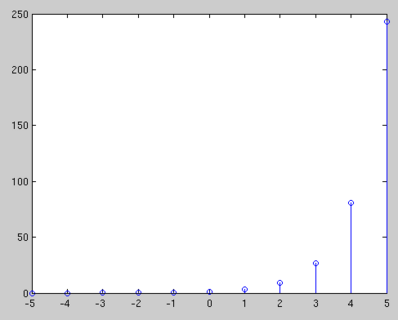| Line 40: | Line 40: | ||
</math> | </math> | ||
| − | === Answer 2=== | + | ===Answer 2=== |
| + | |||
| + | Muhammad Syafeeq Safaruddin | ||
| + | |||
| + | <math>x[n] = 3^n u[n+3]</math> | ||
| + | |||
| + | <math>X(z) = \sum_{n=-\infty}^{+\infty} x[n] z^{-n}</math> | ||
| + | |||
| + | <math>X(z) = \sum_{n=-\infty}^{+\infty} 3^n u[n+3] z^{-n}</math> | ||
| + | |||
| + | <math>X(z) = \sum_{n=-3}^{+\infty} 3^n z^{-n}</math> | ||
| + | |||
| + | <math>X(z) = \sum_{n=-3}^{+\infty} (3/z)^{n}</math> | ||
| + | |||
| + | Let k = n+3, n = k-3 | ||
| + | |||
| + | <math>X(z) = \sum_{k=0}^{+\infty} (3/z)^{k-3}</math> | ||
| + | |||
| + | <math>X(z) = (z/3)^{3} \sum_{k=0}^{+\infty} (3/z)^{k}</math> | ||
| + | |||
| + | <math>X(z) = (z^3/27) \sum_{k=0}^{+\infty} (3/z)^{k}</math> | ||
| + | |||
| + | <math>X(z) = (z^3/27) \sum_{k=0}^{+\infty} (3/z)^{k}</math> | ||
| + | |||
| + | <math>X(z) = (z^3/27) 1/(1-3/z) </math> ,for |z| < 3 | ||
| + | |||
| + | X(z) = diverges, else | ||
| + | |||
===Answer 3=== | ===Answer 3=== | ||
Write it here. | Write it here. | ||
Revision as of 16:33, 12 September 2013
Contents
[hide]Practice Problem on Z-transform computation
Compute the compute the z-transform (including the ROC) of the following DT signal:
$ x[n]=3^n u[n+3] \ $
(Write enough intermediate steps to fully justify your answer.)
You will receive feedback from your instructor and TA directly on this page. Other students are welcome to comment/discuss/point out mistakes/ask questions too!
Answer 1
alec green
$ X(z) = \sum_{n=-\infty}^{+\infty} x[n]z^{-n} $
$ = \sum_{n=-3}^{+\infty} 3^{n}z^{-n} $
$ = \sum_{n=-3}^{+\infty} (\frac{3}{z})^{n} $
Let k = n+3:
$ = \sum_{k=0}^{+\infty} (\frac{3}{z})^{k-3} $
Using the geometric series property:
$ X(z) = \left\{ \begin{array}{l l} (\frac{z}{3})^3 \frac{1}{1-\frac{3}{z}} & \quad |z| > 3\\ \text{diverges} & \quad \text{else} \end{array} \right. $
Answer 2
Muhammad Syafeeq Safaruddin
$ x[n] = 3^n u[n+3] $
$ X(z) = \sum_{n=-\infty}^{+\infty} x[n] z^{-n} $
$ X(z) = \sum_{n=-\infty}^{+\infty} 3^n u[n+3] z^{-n} $
$ X(z) = \sum_{n=-3}^{+\infty} 3^n z^{-n} $
$ X(z) = \sum_{n=-3}^{+\infty} (3/z)^{n} $
Let k = n+3, n = k-3
$ X(z) = \sum_{k=0}^{+\infty} (3/z)^{k-3} $
$ X(z) = (z/3)^{3} \sum_{k=0}^{+\infty} (3/z)^{k} $
$ X(z) = (z^3/27) \sum_{k=0}^{+\infty} (3/z)^{k} $
$ X(z) = (z^3/27) \sum_{k=0}^{+\infty} (3/z)^{k} $
$ X(z) = (z^3/27) 1/(1-3/z) $ ,for |z| < 3
X(z) = diverges, else
Answer 3
Write it here.
Answer 4
Write it here.


